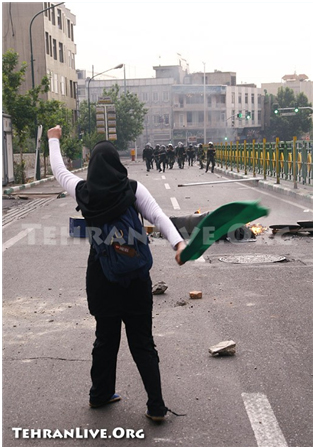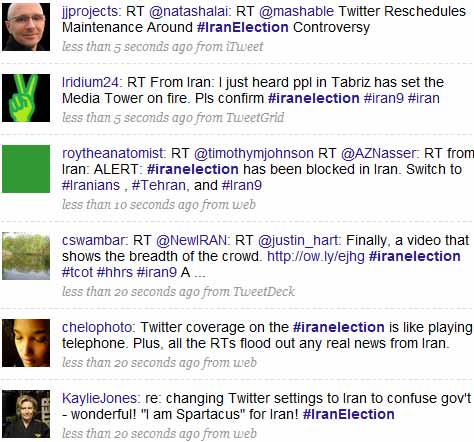Since the election in Iran on the 12th of June, information about the protests and brutal government crackdowns has flowed in via the internet, particularly social media sites, and specifically Twitter. Twitter was the first place to provide information about the protests as the media largely missed the story in the beginning. Now the flow of information out of Iran has slowed due to massive arrests and violent government oppression. Along with the slowing of information, the main stream media's attention has been diverted. Yet this remains a topic that deserves continued public attention. People are fighting for their freedom under unimaginable conditions.
Here is a recap of some of the videos, stories, and information that has come out of Iran along with the role technology has played...
Total Oppression Versus Open Communication in Iran
Videos: The first video shows the death of Neda a young Iranian woman who has come to symbolize the Free Iran movement. She was shot while simply watching the protests, and reportedly died by her father's side. Be warned that the first two videos are very graphic and disturbing. The third video, while somewhat less graphic, but is also quite disturbing.
*VERY GRAPHIC* Young Lady Dies on Streets of Iran
*Very Graphic* Video of Iran Protests and Man Badly Beaten
Shooting of Iranian Students Caught on Camera
Massive Show of Force on Streets of Iran
Video of voter fraud in Iranian Election
June 20 Iran Protesters Face Off with Police
Crowds During June 20th Protests
Riot Police Attack Protesters in Iran
Video Showing Scope of Iranian Protests
This Week's Articles:
This week a violent beat down of protesters was under reported as the flow of information slows. CNN and the AP both had reports on this brutality...
AP Reports Iran Security Forces Again Beat Down the Opposition Protesters
Distraught woman describes the brutality to CNN, Reports of Brutal Crackdown In Iran
Article's Prior to the June 20th Protests
Concern About Khamenei’s Statements
Arrests and Protests Continue in Iran
American’s Practical Support of A Free Iran
Articles About the Role of the Internet in post-Election Iran
Twitter Changing the Playing Field In Iran and For Totalitarianism
Following Iran Elections on Twitter – A Lesson in Freedom and Technology
Iran Elections and the Internet

Since writing about the Twitter Effect in Iran, and the role of the Internet as a whole, I have also been interviewed on radio and TV. For more info on appearances, please visit the Broad Side of the Barn.

Here is a recap of some of the videos, stories, and information that has come out of Iran along with the role technology has played...
Total Oppression Versus Open Communication in Iran
In an early show of force students were beaten in their dorm rooms, and their rooms were trashed, computers and the like destroyed. Angered by the brutal beat downs, many professors at Tehran University protested by resigning. Hospital workers who treated the students, also disgusted by the government’s brutality, went on strike the following day to protest the students’ treatment.
Foreign media was banned, journalists have been jailed. Due to the crackdown, citizen journalism virtually the only way the story is getting to the rest of the world.
Iranian government claims that death of Neda was staged by the opposition. They prevent any form of public mourning for both Neda and the many others killed in the protests.
Soccer Team Members who wore green armbands during a game are permanently banned from the sport.
British representatives expelled from the country.
Special courts established for trying arrested protesters.
Mass show of force and violent suppression of peaceful protests continue.
Videos: The first video shows the death of Neda a young Iranian woman who has come to symbolize the Free Iran movement. She was shot while simply watching the protests, and reportedly died by her father's side. Be warned that the first two videos are very graphic and disturbing. The third video, while somewhat less graphic, but is also quite disturbing.
*VERY GRAPHIC* Young Lady Dies on Streets of Iran
*Very Graphic* Video of Iran Protests and Man Badly Beaten
Shooting of Iranian Students Caught on Camera
Massive Show of Force on Streets of Iran
Video of voter fraud in Iranian Election
June 20 Iran Protesters Face Off with Police
Crowds During June 20th Protests
Riot Police Attack Protesters in Iran
Video Showing Scope of Iranian Protests
This Week's Articles:
This week a violent beat down of protesters was under reported as the flow of information slows. CNN and the AP both had reports on this brutality...
AP Reports Iran Security Forces Again Beat Down the Opposition Protesters
Distraught woman describes the brutality to CNN, Reports of Brutal Crackdown In Iran
Article's Prior to the June 20th Protests
Concern About Khamenei’s Statements
Arrests and Protests Continue in Iran
American’s Practical Support of A Free Iran
Articles About the Role of the Internet in post-Election Iran
Twitter Changing the Playing Field In Iran and For Totalitarianism
One of my first thoughts on seeing Twitter being used by Iranians following their elections was, ‘Imagine if they had Twitter during Tienanmen Square.’ Totalitarian regimes historically thrive, in large measure, by controlling the media and modes of communication. Would be protesters become isolated. Government propaganda simply spins any protest or event into something that reflects well on the regime in power.
Following Iran Elections on Twitter – A Lesson in Freedom and Technology
Google Farsi - English Traslator: Google launches Farsi - English translator Thursday night/Friday morning. A hugely helpful tool that aids communication, and understanding of news directly from Iran.
Cable and Network News relying on Twitter: Saturday the 20th, with a government imposed blackout of foreign media CNN and others have to rely on citizen journalists along with Twitter and other social media sites to gather news. Protests are scheduled even though Ayatola Khamenei has made statements that suggest a possibly violent crackdown on protesters. Reports of tear gas used and armed police barricades used to disperse crowds.
Students Shot on Camera: A tweet linked to this video of Iranian students being shot
A graphic YouTube video of a woman's death (Neda) becomes a symbol of the movement. Trending topic on Twitter is #Neda as references to the video, and her life show how moved people were by her tragic death.
Mousavi Facebook post: Through a post on Facebook it has been reported that Mir-Hossein Mousavi has stated that he is "ready for martyrdom."
Embassies Take Wounded Iranians: Word spreads quickly on June 20th that many European embassies are taking care of wounded Iranians. These embassies along with their address/directions were also diseminated through Twitter. The safety of the hospitals is in question, and the Canadian embassy is pressured (via use of Twitter) to open its embassy too, yet embassy remained closed on Saturday.
Iran Elections and the Internet
An interesting subplot to the Iranian elections is that the internet is providing people more information than major news networks...Dear CNN, Please Check Twitter for News About Iran

Since writing about the Twitter Effect in Iran, and the role of the Internet as a whole, I have also been interviewed on radio and TV. For more info on appearances, please visit the Broad Side of the Barn.








